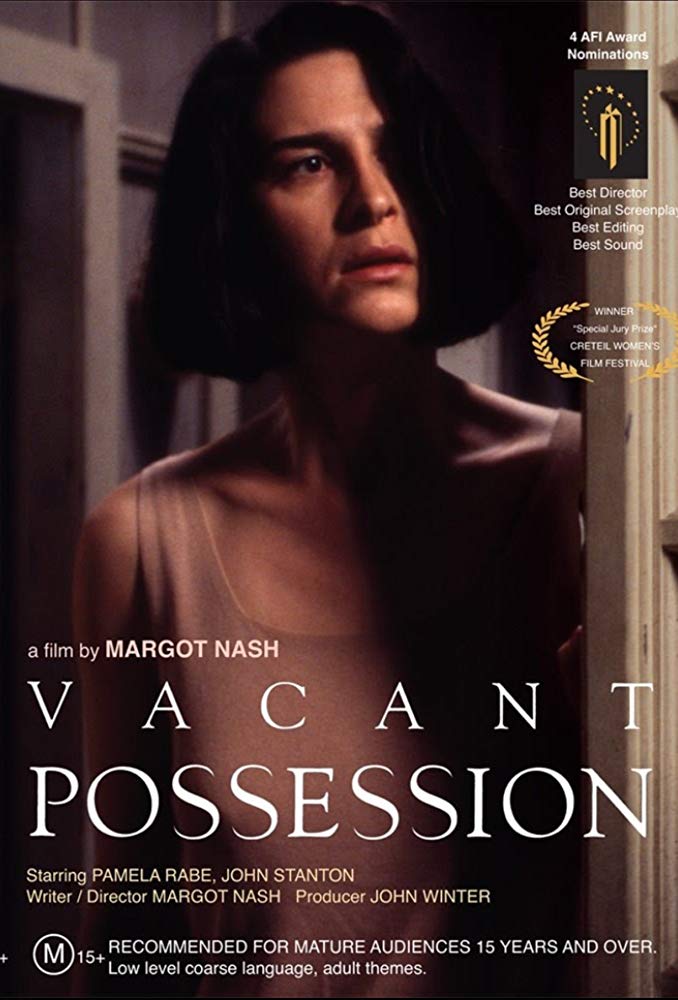

Vacant Possession (Margot Nash, 1995) wr. Margot Nash, dp Dion Beebe, ed. Veronika Jenet; Pamela Rabe, John Stanton, Toni Scanlan, Linden Wilkinson, Rita Bruce, Olivia Patten as Millie, who provides the commentary on the actual relationship of white and black; John Stanton, the father, has PTSD or 'shell-shock', following WW2 air crash with loss of crew; 95 min.
You may never have heard of this, which is a pity. Vacant possession = terra nullius, and it's actually set in modern Botany Bay. I hope it's not forgotten; it's very good. In fact, it's one of the most important features made in this country.
In 2021 it has been restored and screened at the Melbourne IFF.
I've just (7 Aug 2021) heard a chat about the film between Margot Nash and Jason di Rosso, on ABC RN.
Carly Harper:
... we can see that Vacant Possession is very much a 'white story', and Nash asserts herself that this is what she perceived as the strength of the film. That is whilst the film deals with the 'difficulty and ambivalence of the relationship between white Australians and the land, and between indigenous peoples and colonisers, the film doesn't as such attempt to tell 'Aboriginal stories'. Nash states herself that: 'I came to understand that as a white person I couldn't tell Aboriginal stories. That's for Aboriginal people to do (Corbett, 1995:18). Nash also talks about this process in one interview, about the difficulties of being overtly 'politically correct' only ending up in 'cliche land'. Nash therefore acknowledges the difficulties that come with her position, but this is the one criticism (that I am aware of), that was made of the film. Anna Dzenis, in her review points to moments where the film was 'heavy handed', 'wearing its heart too much on its sleeve' (Dzenis, 1996:54). I would agree with Dzenis that there were rather self aware or obviously 'well intended' moments in the film, like Dzenis, however I would also agree that by no means was the film's 'overall vision' destroyed by these moments. Carly Harper.
Pamela Rabe:
Vacant Possession is like a love letter to the land. It is a love letter that acknowledges the difficulty and ambivalence of the relationship between white Australia and the land, and between indigenous people and colonisers. It also hints at a different connection that Aboriginal Australians have with the land, a bond not confined to the dream of owning a house. Pamela Rabe, quoted in Corbett 1996: 18.
"Probes the question of Australian identity, intelligently and cinematically" – David Stratton, Variety.
"Nash's handling of the material is vivid and inventive. It's a truly exciting piece of cinema ... Unquestionably one of the best and most impressive Australian films of the 1990s." – Adrian Martin, The Age, Melbourne.
"Daring and mature ... a landmark Australian film" - Anna Maria Dell 'Oso, Sydney Morning Herald.
Adrian Martin review, 9 June 1995, The Age:
MARGOT Nash's Vacant Possession, premiering at the Melbourne International Film Festival, is one of the most striking and assured Australian feature debuts of recent years.
The plot resonates uncannily with that of Hotel Sorrento — a woman (the superb Pamela Rabe) returns to her home in New South Wales, fights with her sister (Linden Wilkinson) and tries to come to terms with a deeply disturbed father (John Stanton).
But Vacant Possession takes a broader social perspective than Hotel Sorrento. For the heroine of tills film, exploring the past includes facing up to the Aboriginal legacy in Australian history.
Fortunately, this is not a gingerly “politically correct" movie. Vivid elements of racial and sexual and melodrama bring it powerfully alive.
Above all, it is a surrealist-inspired “dream film" that evokes a history of women’s cinema running from Maya Deren to Susan Dermody’s Breathing Under Water (1991). Rabe confronts the ghosts of her history in a haunted family house; past and present experiences freely intermingle. The emotions stirred within her are complex and ambivalent.
Often brilliantly directed —-with superb cinematography from Dion Beebe and a compellingly atmospheric soundtrack — Vacant Possession is a truly exciting piece of cinema, and certainly the best Australian film to have appeared so far this year.
The Melbourne International Film Festival. Astor, Mon 6pm.
— Adrian Martin
Corbett, Claire 1996, 'Sacred land and haunted houses', Cinema Papers, no. 104, June: 18-21.
Dzenis, Anna 1996, 'Vacant Possession—film review', Cinema Papers, no. 110, June: 52, 54.
Martin, Adrian 1995, Review, filmcritic.com.
Simpson, Catherine 2000, Imagined Geographies: Women's Negotiation of Space in Contemporary Australian Cinema, PhD dissertation, Murdoch University, Perth, Western Australia.
Garry Gillard | New: 27 October, 2012 | Now: 2 October, 2022